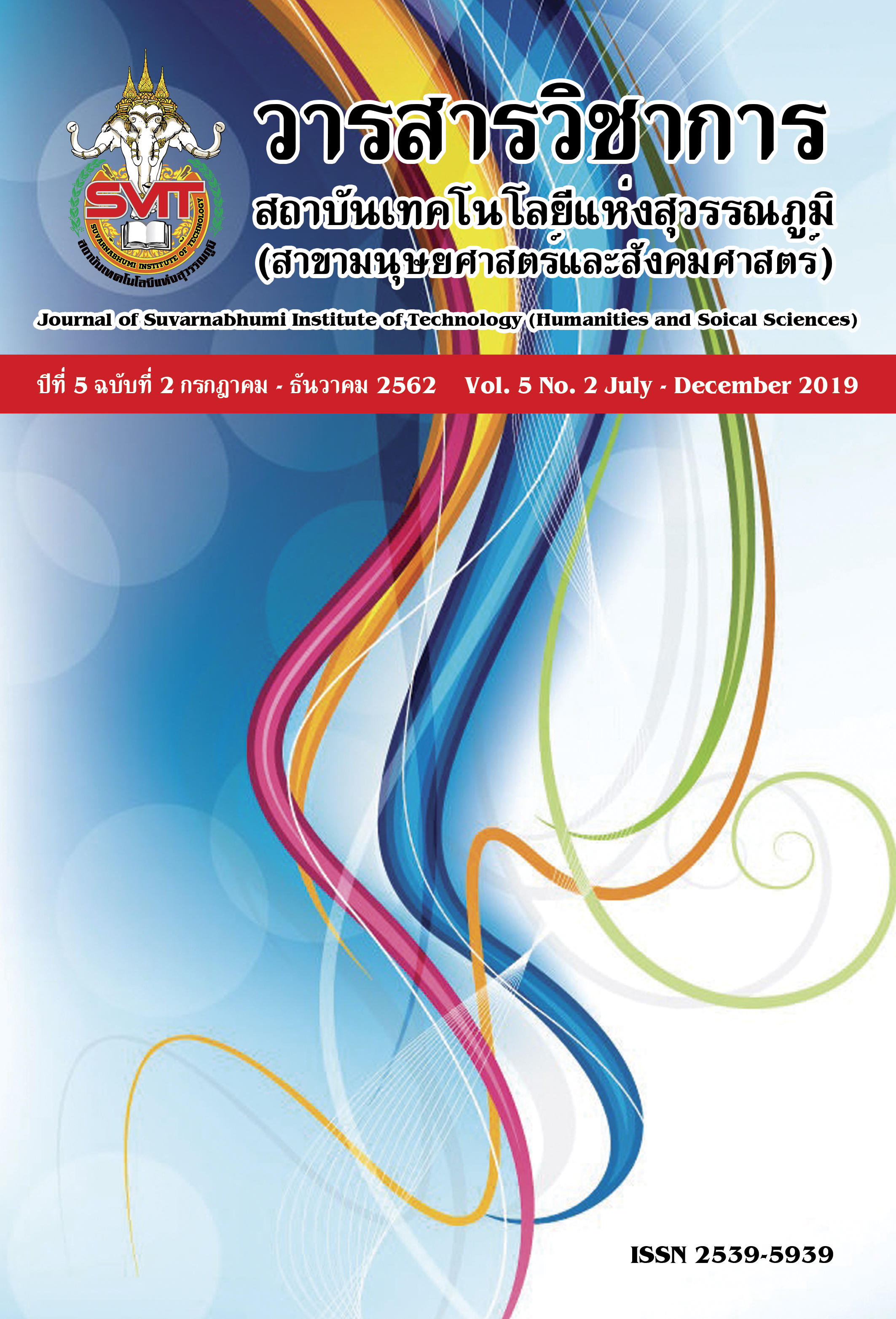HUMAN RESOURCE MANAGEMENT AND OPERATIONAL BEHAVIOR AND THEIR EFFECTS ON OPERATIONAL CAPACITY IN INDUSTRIAL FACTORY EMPLOYEES IN PATHUM THANI PROVINCE
Keywords:
Human resource management, Operational behavior, Operational capacityAbstract
The objectives of this research were to study 1) the level of significance of human resource management, operational behavior, and performance capacity, 2) human resource management effects on performance capacity of industrial factory employees in Pathumthani province, 3) human resource management effects on operational behavior of industrial factory employees in Pathumthani province, 4) operational behavior effects on performance capacity of industrial factory employees in Pathumthani province, and 5) human resource management and operational behavior relationship with performance capacity of industrial factory employees in Pathumthani province. The population and sample are employees of industrial factories in Pathumthani province of which there are 3,887 factories. With purposive sampling, 30 factories were chosen with 385 sample size from unknown population sampling. 13 employees were sampled per factory. The research tools were questionnaires and interviews as a quantitative research. The statistic used were frequency, percentage, mean, standard deviation, effects were calculated with multiple regression analysis and relations were calculated with Pearson correlation. The qualitative research were analyzed with content analysis.
The study result showed that:
1) The level of significance of human resource management, operational behavior, and performance capacity in all aspects were high.
2) Human resource management had positive effects on performance capacity of industrial factory employees in Pathumthani province (β = .394, Sig < .01) and positive multiple correlation coefficients (R) of .394 and (R2) of .156 or 15.6%.
3) Human resource management had positive effects on operational behavior of industrial factory employees in Pathumthani province (β =.499, Sig < .01) and positive multiple correlation coefficients (R) of .499 and (R2) of .249 or 24.9%.
4) Operational behavior had positive effects on performance capacity of industrial factory employees in Pathumthani province (β = .787, Sig <.01) and positive multiple correlation coefficients (R) of .787 and (R2) of .619 or 61.9%.
5) Human resource management (r = .499) and operational behavior (r = .394), had a low positive relationship with performance capacity. And operational behavior had a high positive relationship with performance capacity (r = .787) all of which is statistically significant at .01.
References
เบญญาภา เอกวัตร. (2556). การศึกษาปัจจัยที่มีอิทธิพลต่อสมรรถนะการปฏิบัติงานของบุคลากรองค์การ บริหารส่วนตำบลในจังหวัดประจวบคีรีขันธ์. วารสารศิลปากรศึกษาศาสตร์วิจัย ปีที่ 5 ฉบับที่ 1 2556.
สมบูรณ์ ศรีสมานุวัตร. (2553). การพัฒนาสมรรถนะของบุคลากรในองค์กรโดยอาศัยสมรรถนะ Competency-based HRD. หลักสูตรวิทยาศาสตร์มหาบัณฑิต สาขาวิชาเทคโนโลยีสารสนเทศ บัณฑิตวิทยาลัย, มหาวิทยาลัยเทคโนโลยีมหานคร.
สุวิทย์ เมษินทรีย์. (2559). ประเทศไทย 4.0. สืบค้น 25 เมษายน 2560 จาก https://planning 2. mju.ac.th/ goverment/20111119104835_planning/Doc_25590823143652_358135.
Alldredge, M. E., & Nolan, K. J. (2000). 3M’s leadership competency model: An internally developed solution. Human Resource Management, 39, 133–145.
Cancelliere et al. (2011). BMC Public Health. 2011, 11:395.
Chuang, C.H., & Liao, H. (2010). Strategic Human Resource Management in Service Context: Taking care of business by taking care of employees and customers. Personnel Psychology. 63. 153-196.
Cochran, W.G. (1953). Sampling Techniques. New York : Johe Wiley & Sons. Inc.
Dizgah, Mehrdad Goudarzvand Chegini, Farzin Farahbod, Sajjad Salehi Kordabadi. (2011). Employee Empowerment and Organizational Effectiveness in the Executive Organizations. Journal of Basic and Applied Scientific Research, J. Basic. Appl. Sci. Res., 1(9)973-980, 2011.
Forster, David., et al. (2000). Career Assignment Program (Cap) Competency Development Resource Guide. Canada: Public Service Commission of Canada. ca/cap/pdf/cap_ guide_e.pdf Management. Davies – Black Publishing, California.
Gittell, J.H., Seidner, R.B., Wimbush, J. (2010). A Relational Model of How High- Performance Work Systems Work. Organization Science, 21(2): 490-506.
Gong, Y., Law, K.S., Chang, S., & Xin, K.R. (2009). Human resources management and firm performance: The differential role of managerial affective and continuance commitment. Journal of Applied Psychology, 94(1).
Gong, Y., Chang, S., & Cheung, S. (2010). High performance work system and collective OCB: A collective social exchange perspective. Human Resource Management Journal. 20. 119-137.
Hellriegel, Don., Jackson Susan E.,Slocum, John W. (2001). Management: A Competency Based Approach, 9th ed. United State of America: Thompson, South-Western Educational Publishing.
Kennedy, Peter W.; Dresser, Sandy Grogan. (2009). Creating a Competency-Based Workplace. Benefits & Compensation Digest; Feb2005, Vol. 42 Issue 2, p1.
Nai-Wen Chi., & Carol Yeh-Yun Lin, (2010). Beyond the High-Performance Paradigm: Exploring the Curvilinear Relationship between High-performance Work System and Organizational Performance in Taiwanese Manufacturing Firms. British Journal of Industrial Relations. 49(3). 486-514.
Nishii, L.H., Lepak, D.P., & Schneider, B. (2008). Employee attributions of the “why” of HR practices: Their effects on employee attitudes and behaviors, and customer satisfaction. Personnel Psychology. 61. 503–545.
Robinson, G. C. (1994). Managers in Team: How Valuing Individualism or Collectivism Affects Their Participation. Dissertation Abstracts International, 55(04).
Robbins and Coulter. (2007: 89). Organization Theory: Structure, Design, and Applications. New Jersey: Prentice-Hal.
Schiffman, Leon G., & Kanuk, Leslic L., (2000). Consumer Behavior, 7th ed., upper saddle river. NJ: Prentice Hill.
Wageeh Nafei. (2015). The Effects of Job Embeddedness on Organizational Cynicism and Employee Performance: A Study on Sadat City University. International Journal of Business Administration ISSN 1923-4007(Print) ISSN 1923-4015 (Online)
Zwell, M. (2000). Creating a Culture of Competence. New York: John Wiley and Sons, Inc.
Downloads
Published
Issue
Section
License
The articles published are copyrighted by the Sarasas Journal of Humanities and Social Science. The opinions expressed in each article in this academic journal are those of the individual authors and do not reflect the views of Sarasas Suvarnabhumi Institute of Technology. The authors are solely responsible for all aspects of their respective articles. Any errors or inaccuracies in the articles are the sole responsibility of the authors.



